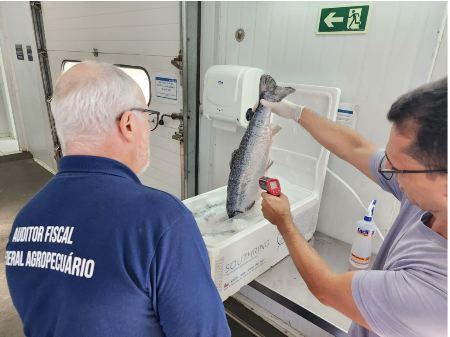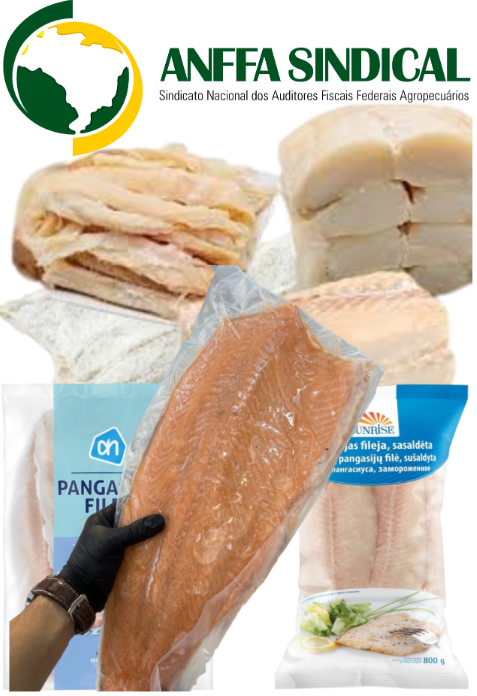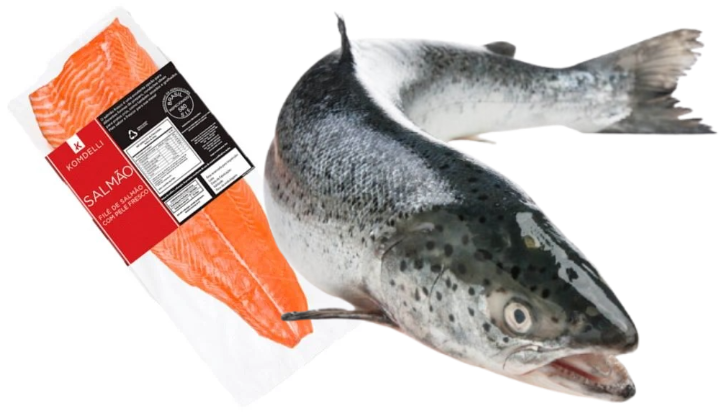|

Photo: courtesy Anffa Sindical
Smart Seafood Choices for Holy Week: Anffa Sindical Offers Consumer Guidance
 BRAZIL
BRAZIL
Thursday, April 17, 2025, 10:00 (GMT + 9)
As fish imports rise for Easter, federal auditors advise on quality checks to ensure safe and informed purchases.
 With the significant increase in fish consumption during Brazil's Holy Week – a tradition that invigorates markets nationwide – the National Union of Federal Agricultural Auditors (Anffa Sindical) is providing essential guidance for consumers. Popular choices like cod, tilapia, sardines, and salmon see a surge in demand for traditional suppers and other meals during this period. Anffa Sindical, which closely monitors the work of professionals inspecting both imported and domestically produced seafood, aims to empower consumers to select high-quality options during this peak season. With the significant increase in fish consumption during Brazil's Holy Week – a tradition that invigorates markets nationwide – the National Union of Federal Agricultural Auditors (Anffa Sindical) is providing essential guidance for consumers. Popular choices like cod, tilapia, sardines, and salmon see a surge in demand for traditional suppers and other meals during this period. Anffa Sindical, which closely monitors the work of professionals inspecting both imported and domestically produced seafood, aims to empower consumers to select high-quality options during this peak season.
To meet this heightened demand, Brazil supplements its domestic fish production with substantial imports. Products such as cod and salmon, often sourced from countries like Norway and Chile, undergo rigorous health controls to guarantee their safety for consumption.
Data from the Ministry of Development, Industry, Commerce and Services (MDIC) indicates a slight decrease (5.9%) in imports of frozen, fresh, or chilled fish fillets and meat in the first quarter of this year compared to the same period last year (when Easter fell in March). Total imports for the first quarter reached 41.7 thousand tons.
 According to Cristhiane Stecanella de Oliveira Cattani, Anffa Sindical delegate in Santa Catarina and a federal agricultural tax auditor, the influx of cod and salmon at Brazilian ports and airports intensifies starting in December, aligning with the anticipated rise in demand. According to Cristhiane Stecanella de Oliveira Cattani, Anffa Sindical delegate in Santa Catarina and a federal agricultural tax auditor, the influx of cod and salmon at Brazilian ports and airports intensifies starting in December, aligning with the anticipated rise in demand.
“There is an increase in fish imports at this time of year, especially due to Holy Week, which significantly boosts fish consumption in Brazil. This trend intensifies in the months leading up to the celebration, with peak demand typically observed between March and April,” explains Cattani.
These imported and domestically sourced products undergo thorough inspection by federal agricultural inspectors at ports, airports, borders, and processing facilities. These professionals conduct physical and documentary checks, as well as collect samples for laboratory analysis to ensure compliance with all health regulations and freedom from contamination and irregularities.
“For national fish, inspection begins upon unloading at the processing plant, whether from the sea or aquaculture farms. This includes verifying documents, traceability, temperature, sensory aspects, and the entire processing chain, right up to dispatch for sale,” details the Anffa Sindical delegate.

Anffa Sindical's Tips for Safe Fish Selection:
For consumers, the primary recommendation is to verify the origin of the products. When choosing fish, pay close attention to the following:
Fresh and Frozen Fish:
- Appearance: Look for bright, bulging eyes, firm scales, and red or pink gills.
- Odor: The smell should be mild and fresh, reminiscent of the sea. Strong or unpleasant odors indicate spoilage.
- Storage: Ensure the fish is stored under proper refrigeration or on ice. Frozen products should not be soft or contain excessive liquid.
- Inspection Seal: Check for the official health certification from the SIF (Federal Inspection Service).
- Weighing: For fresh fish, observe the weighing process to avoid paying for the weight of ice or packaging.
- Validity and Packaging: Check the expiration date and avoid products with damaged labels or signs of poor packaging.

Salted Fish (such as Cod):
- Color and Texture: The fish should have a clear and uniform color, without dark or reddish spots.
- Smell: The odor should be characteristic of salted fish, without any rancid or putrid smells.
- Salt Content: Be aware that excessive salt might be used to mask poor quality.
- Certification: Always check the origin, label, and look for a health inspection seal.
 Anffa Sindical also emphasizes that other popular Easter foods, such as olive oil and chocolate eggs, are subject to the same rigorous inspections by federal agricultural inspectors, covering everything from raw materials to labeling, expiration dates, and storage conditions. Anffa Sindical also emphasizes that other popular Easter foods, such as olive oil and chocolate eggs, are subject to the same rigorous inspections by federal agricultural inspectors, covering everything from raw materials to labeling, expiration dates, and storage conditions.
“During this period of increased demand, Anffa Sindical underscores the crucial role of federal agricultural inspectors in safeguarding public health, protecting consumers, and promoting the value of Brazilian agricultural products. The technical, meticulous, and continuous work of these professionals ensures that the food consumed during Holy Week — and throughout the year — reaches the population with the quality and safety it deserves,” states Anffa Sindical president Janus Pablo Macedo.
Source: Anffa Union Advisory
[email protected]
www.seafood.media
|
|



